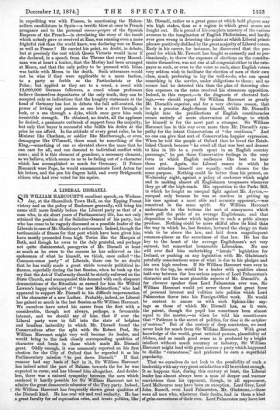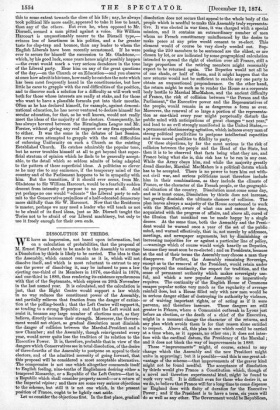A LIBERAL DISRAELI.
SIR WILLIAM HARCOURT'S excellent speech, on Wednes- day, at the Shoreditch Town Hall, on the Epping Forest
victory and on the policy of Enclosure generally, will bring his name still more freshly before the Liberal party as that of a man who, in six short years of Parliamentary life, has not only attained the position of the Solicitor-General of his party, but who has come to be vaguely discussed as a possible leader of the Liberals in case of Mr. Gladstone's retirement. Indeed, though the testimonials of fitness for that post which have been given him have mostly proceeded from high Tories like the Marquis of Bath, and though he owes to the duly grateful, and perhaps not quite disinterested, panegyrics of Mr. Disraeli at least as much as he owes to the success he has achieved as the spokesman of what he himself, we think, once called "the Common-sense party" of Liberals, there can be no doubt that he has really made a great stride towards polititical in- fluence, especially during the last Session, when he took up the cry that the Act of Uniformity should be strictly enforced on the State Church, and accompanied this demand with such eloquent denunciations of the Ritualists as earned for him Sir Wilfrid Lawson's happy sobriquet of "the new Melancthon," who had appeared to support Mr. Disraeli in his difficult impersonation of the character of a new Luther. Probably, indeed, no Liberal has gained so much in the last Session as Sir William Harcourt.
We ourselves have noted his career from the first with a considerable, though not always, perhaps, a favourable interest, and we should say of him that if ever the Liberal party were to fall into the state of helpless and headless imbecility in which Mr. Disraeli found the
Conservatives after the split with Sir Robert Peel, Sir William Harcourt might very well become its leader, and would bring to the task closely corresponding qualities of character and brain to those which made Mr. Disraeli great. Oddly enough, it was commonly reported on his first election for the City of Oxford that he regarded it as his Parliamentary mission "to put down Disraeli." If that rumour had any basis of fact in it, Sir William Harcourt has indeed acted the part of Salaam towards the foe he was expected to curse, and has blessed him altogether. And doubt- less, there was a natural sympathy between the men which rendered it hardly possible for Sir William Harcourt not to admire the great democratic educator of the Tory party. Indeed, Sir William Harcourt has frequently shown great qualities of the Disraeli kind. He has real wit and real audacity. He has a great faculty for ad captandunt cries, and treats politics, like Mr. Disraeli, rather as a great game at which bold players may win high stakes, than as a region in which great causes are fought out. He is proud of his complete mastery of the various avenues to the imagination of English Philistinism, and hardly ever goes wrong in detecting the points at which Liberal princi- ples are positively disliked by the great majority of Liberal voters. Early in his career, for instance, he discovered that the pro- posal for which Mr. Fawcett has fought so earnestly and so per- tinaciously, to throw the expenses of elections on the constitu- encies themselves, was not one at all congenial either to the rate- payer as such, or even to the voter as such, since English voters very seldom wish to facilitate the election of men of their own class, much preferring to lay the well-to-do, who can spend something in the service, under obligations to them ; and no sooner had he detected this than the plan of throwing elec- tion expenses on the rates received his strenuous opposition.
. .
Indeed, in this respect,—in the diagnosis of electoral feel- ings,—we should regard Sir William Harcourt as greatly Mr. Disraeli's superior, and for a very obvious reason, that he is a genuine Anglo-Saxon himself, while Mr. Disraeli's insight into the predilections of English constituencies comes entirely of acute observation of feelings to which he himself is for the most part a stranger. Sir William Harcourt has in this way even more than Mr. Disraeli's sym- pathy for the latent Conservatism of "the residuum." And no one can give that sort of Conservatism happier expression. When he told the people of Oxford that he loved the Estab- lished Church because "he owed all that was best and dearest to him in life to a youth spent in an English country parsonage," he put these Conservative feelings in the very form in which English audiences like best to hear them put. Again' the Liberal causes to which he most attaches himself are equally well chosen for the same purpose. Nothing could be better than his protest, on Wednesday night, against a policy of enclosure which might end in making almost all Englishmen trespassers whenever they go off the high-roads. His opposition to the Parks Bill, in which he fought an unequal fight against Mr. Ayrton,— unequal only because he was so careless in getting up his case against a most able and accurate opponent,—was conceived in the same spirit. Sir William Harcourt understands to the bottom the sort of annoyances which most gall the pride of an average Englishman, and that disposition to bluster which injuries to such a pride always produce. Nothing could be more skilful after its kind than the way in which he, last Session, lectured the clergy on their wish to be above the law, and laid down magniloquent common-places on the sacredness of that law. He has the key to the heart of the average Englishman's not very earnest, but somewhat bounceable Liberalism. No one will ever find him undertaking " heroic " legislation for
Ireland, or pushing on any legislation with Mr. Gladstone's painfully conscientious sense of what is due to his pledges and his own high resolves. If Sir William Harcourt were ever to come to the top, he would be a leader with qualities about half-way between the less serious aspects of Lord Palmerston's
character and the most plausible aspects of Mr. Disraeli's. A far cleverer speaker than Lord Palmerston ever was' Sir William Harcourt would yet never throw that great force
of personal interest and volition into polities which Lord Palmerston threw into his Foreign-Office work. He would be content to amuse us with such Sphinx-like say-
ings as those of which Mr. Disraeli has, as it were,
the patent, though the pupil has sometimes been almost equal to the master,—as when he told his constituents
that "Patience is the secret of politics, for time is the artificer of nations." But of the oratory of deep conviction, we need never look for much from Sir William Harcourt. With great knowledge of the world, great satirical powers, plausibility ad libitum, and as much good sense as is produced by a bright intellect without much accuracy or industry, Sir William
Harcourt might lead with great success a party which happened to dislike "earnestness," and preferred to earn a superficial popularity.
That we ourselves do not look to the possibility of such a leadership with any very great satisfaction will be evident enough.
It so happens that, during this century at least, the Liberal leader has almost always been a man of deeper and warmer convictions than his opponent, though, to all appearance, Lord Melbourne may have been an exception. Lord Grey, Lord John Russell, even Lord Palmerston, Mr. Gladstone,—these were all men who, whatever their faults, had in them a kind of grim earnestness of their own. Lord Palmerston may have lost
this to some extent towards the close of his life ; nay, he always took political life more easily, appeared to take it less to heart, than any of the others. But even he, when opposed to Mr. Disraeli, seemed a man pitted against a voice. Sir William Harcourt is unquestionably nearer to the Disraeli type,— evinces less of heartiness in his politics, and a far greater taste for clap-trap and bounce, than any leader to whom the English Liberals have been recently accustomed. If he were ever to secure for himself the succession to Mr. Gladstone,— which, by his good luck, some years hence might possibly happen —the event would mark a very serious decadence in the tone of the Liberal party. Hear him on any of the great questions of the day,—on the Church or on Education—and you observe at once how adroit is his tone, how easily he catches the note which has been most frequently heard in the constituencies, but how little he cares to grapple with the real difficulties of the position, and to discover such a solution for a difficulty as will work well both for those whose interests are really at stake, and for those who want to have a plausible formula put into their mouths. Often as he has declared himself, for example, against denomi- national education, he has never ventured to declare himself for secular education, for that, as he well knows, would not really meet the ideas of the majority of the electors. Consequently, he has always hovered between the Birmingham League and Mr. Forster, without giving any real support or any firm opposition to either. It was the same in the debates of last Session. He never even attempted to grapple with the real difficulties of enforcing Uniformity on such a Church as the existing Established Church. He catches admirably the popular tone, but he never troubles himself at all to get beyond that super- ficial stratum of opinion which he finds to be generally accept- able, to the detail which so seldom admits of being adapted to the pattern of these superficial ideas. A politician so clever as he may rise to any eminence, if the temporary mind of the country and of the Parliament happens to be in sympathy with him. But the transition, if it should ever occur, from Mr. Gladstone to Sir William Harcourt, would be a fearfully sudden descent from intensity of purpose to no purpose at all. And yet perhaps no one would " educate " the Liberal party to sub-. mit to the Conservative prejudices of a half-educated democracy more skilfully than Sir W. Harcourt. Now that the Residuum is master, perhaps we may need a leader who will teach us not to be afraid of its fixed ideas, just as Mr. Disraeli taught the Tories not to be afraid of our Liberal machinery, but only to use it freely enough for their own ends.







































 Previous page
Previous page